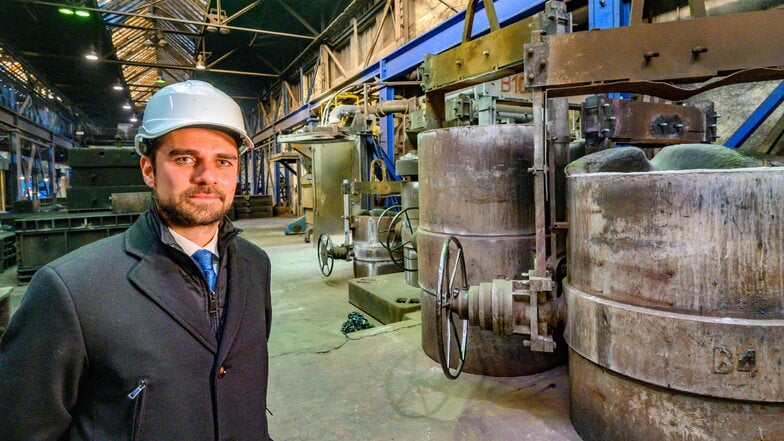From George Moeritz
Dresden. The three presidents of the Saxon Chambers of Industry and Commerce (IHK) rarely mention party names when they comment on economic policy. In the election campaign, they express their wishes but do not appear as party supporters. However, they have positioned themselves against "right-wing populism". Even in the latest press release on Thursday, no party is mentioned by name when the three chambers complain about "obstructionism" in Berlin. Previously, they had repeatedly denounced the policies of Berlin's traffic light coalition. This time, however, it is against the CDU.
The three Saxon chambers are jointly appealing "to the federal government and the Free State" to pass the Growth Opportunities Act as quickly as possible. The reason why the Free State is mentioned is because the Bundesrat, as the chamber of the federal states, has so far blocked the growth package for companies in Berlin. The Bundesrat is due to vote on the law again on March 22. Saxony will be involved, with the CDU as the governing party, which is in opposition in Berlin.
In their press release, the three CCIs write that the "blockade attitude in view of the financial consequences" is difficult to understand. For this year, general government revenue at federal, state and local level is predicted to be almost one trillion euros. A relief of around six billion euros for the economy should be possible.
IHK demand: Do not slim down the Growth Opportunities Act
The German government had originally prepared to provide seven billion euros in relief for the economy. Federal Economics Minister Robert Habeck (Greens) said in Berlin on Wednesday that the package had been "negotiated down from eight to three billion euros". The chambers are calling for the Growth Opportunities Act to be passed "with the originally planned relief".
The Saxon chambers of commerce state that a broad reduction in corporate taxes does not appear to be politically feasible at present. However, at least the depreciation conditions must be improved in such a way that urgently needed investments are stimulated. The chambers cite examples: Improving the offsetting options for losses in taxation, higher allowances for research and development in companies, higher premiums for climate protection and energy efficiency.
Criticism of legislative blockade due to other demands
Industry and trade representatives complain that negotiations in Berlin on this hoped-for relief are being linked to other items in the federal budget. The CDU is demanding that the federal government continue to grant farmers the usual tax relief on diesel. Farmers across Germany took to the streets to block highway access roads in opposition to the increase in agricultural diesel. Saxony's state farmers' president Torsten Krawczyk relied on the support of CDU Minister President Michael Kretschmer and issued an ultimatum to the Green Minister of Agriculture Wolfram Günther due to late payments of subsidies in Saxony.
Just a few weeks ago, Saxony's Chamber of Industry and Commerce presidents complained about the traffic light government. The Chemnitz chamber president and foundry boss Max Jankowsky presented survey results from Saxony's companies in Dresden and said that the bad diagnosis did not seem to be accepted by the federal government. As the Heringsdorf Circle, all 14 East German CCI presidents wrote together to Chancellor Olaf Scholz (SPD) and complained that there was "never" any concrete implementation and initiatives from the federal government in response to demands to reduce bureaucracy. Instead of the Chancellor the East German DGB leaders responded to the open letter and accused companies of paying too low wages in the East.
Saxon Craftsmen's Association deplores political skirmishes
On Thursday afternoon, the Saxon Craftsmen's Association also urged that the Growth Opportunities Act be passed quickly - and with it investment incentives and relief. "Political skirmishes between the federal government, Bundestag and state chambers" are of no use to anyone in an economic downturn, the press release stated. Structural reforms are urgently needed to relieve the burden on small and medium-sized companies in the skilled trades and SMEs.
The Handwerkstag also did not name a party in its paper. In addition, the statement was expressly published by the managing director Andreas Brzezinski instead of the honorary president Jörg Dittrich, who is often in conversation with politicians and has already welcomed Federal Minister of Economics Habeck to his roofing company.
The Central Association of the German Construction Industry also complained on Thursday that the renewed delay to the law was coming at an inopportune time. Without quick investment incentives, residential construction will "collapse completely at some point", the association wrote. "Some people still don't seem to fully understand the seriousness of the situation." In contrast to the Saxon chambers, the association did not hold back completely with references to the parties: the failed compromise "between the traffic light and the CDU/CSU" was an immense missed opportunity.








